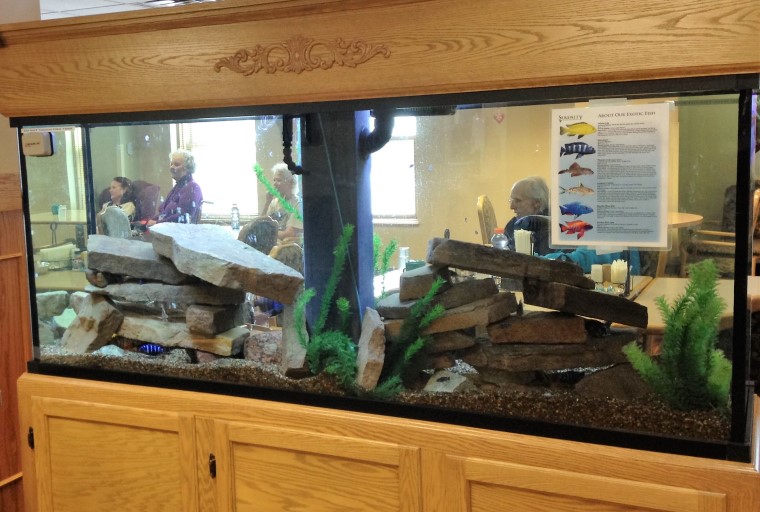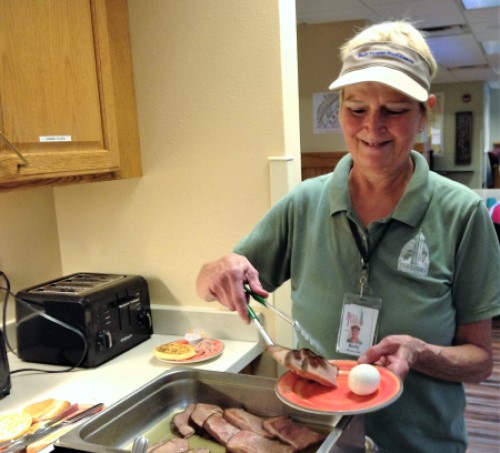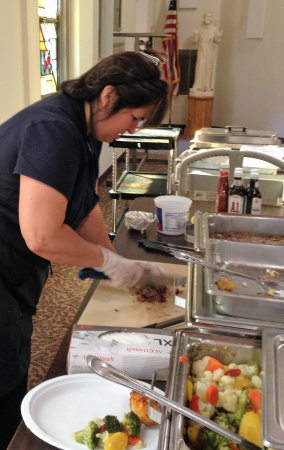Word was at Bell Tower Residence [3/3/2023: URL Updated] (BTR) in Merrill, Wisconsin, that the annual caregiver conference keynote speaker would be a resident for several days.
Beyond the attention and care I received, staff members made sure residents were comfortable and had what they needed. A skeptic would observe this as temporary good behavior while I was there. Yet, people with dementia in memory care have difficulty with judgment. They act without a filter. One would easily notice something was amiss by their reactions. Instead, I observed attentive care consistently and the residents remained cooperative.
The dietary aide ensured each resident received the appropriate meal per that resident’s dietary guidelines. No sugar for some. Soft foods for others. Regular foods – for some, a half- sandwich; others a whole. Mealtimes proceeded calmly with little if any fuss. Those who could not feed themselves were assisted by an aide.
Housekeeping delivered clean linens each morning. “I don’t change them every day at home… no need to change them during the three nights I’ll be here,” I replied when the supervisor offered to change my linens.
The nurse reviewed and double-checked her notes to make sure each resident got the right medications and doses.
Meanwhile, I enjoyed my one-bedroom suite with extra covers for this blood-thinned Wisconsin transplant living in California. Baby, it’s cold outside!
A Delightful Time?
Would I get along with my new housemates?
While they invited me to sit where I pleased during meals, the nutritional aides recommended I join the more conversational residents. I took their advice and made friends easily next to a giant fish tank. We talked, we laughed, we even teased as I answered one younger resident’s repeated queries. “Why are you here?”

“I chose to stay at BTR, instead of a hotel, because I’m presenting at the caregiver conference. Besides, I’ll have fun stories to tell!”
“Why are you here?” “How long will you stay?”
 Meanwhile, the dietary aides brought me more food than I needed. I appreciated their rationale: You need the energy. You’re speaking and running up and down the stairs. They were kind and limited my portions; especially, at night, while adding more protein-rich foods in the morning. I brought along powdered protein but never needed it during my stay.
Meanwhile, the dietary aides brought me more food than I needed. I appreciated their rationale: You need the energy. You’re speaking and running up and down the stairs. They were kind and limited my portions; especially, at night, while adding more protein-rich foods in the morning. I brought along powdered protein but never needed it during my stay.
 I was truly impressed by how far the staff goes to please their family members – the residents. One didn’t like the plain-pure-beef patty. I asked her what she preferred. “Bacon.” “Okay.” I turned to the dietary aide and explained what happened and asked if she could provide some bacon. BOY HOWDY, in about ten minutes a plate with five-large pieces of crispy fried bacon was placed before her! She ate them all!
I was truly impressed by how far the staff goes to please their family members – the residents. One didn’t like the plain-pure-beef patty. I asked her what she preferred. “Bacon.” “Okay.” I turned to the dietary aide and explained what happened and asked if she could provide some bacon. BOY HOWDY, in about ten minutes a plate with five-large pieces of crispy fried bacon was placed before her! She ate them all!
A former college student, Marsha, from Milwaukee came to visit while I was finishing dinner. We planned to go out for dinner but I didn’t see her messages on my smartphone while enjoying the company of my newfound dinner companions.
We invited the bacon-loving resident to join us at a local pub. “Are you really serious?” she asked.
“Yes!” She declined but we saw how being invited uplifted her spirits with a smile.
We got together with Marsha’s sisters-in-law as she exclaimed to them, “Brenda really fit in! I’m surprised how well she fit in. She knew each of the residents’ stories at her table. They were chatting back and forth. They were having fun as if they’d known each other for years!” (All that was after my second dinner at BTR!)
Despite My Fears, Knowing Helps
Will they like me? Will I fit in? Whose table will I sit at?
Having learned a lot about dementia over the past 23 years, I felt at ease with the residents. They told stories of how they came to live at Bell Tower. They talked of their occupations. They expressed their wants and needs. I listened attentively. Their stories helped them maintain their dignity.
Creating Mischief
The final night I would stay at Bell Tower, I wanted to create a little mischief. Some residents were quietly engaged in activities at their tables. Others watched an old Western on TV. Most were winding down before bedtime.
Feeling feisty, I exclaimed, “Hey, whad’ya say we all go out for a walk?”
Some looked up.
“Yeah, we had a nice hearty meal… we need to walk it off otherwise we’ll get fat!”
More looked at me, trying to understand what I really meant. One reminded me there was snow and ice on the ground.
“We’ll take it slow,” I assured them.
Some appeared to actually consider this out-of-the-ordinary suggestion. The truth is, it was freezing outside. Beyond that, I would have needed permission from family members in advance and the approval of Bell Tower.
Bottom Line: We had a good reason to laugh before retreating to our rooms for a night of rest.
Why You Should Stay at A Residential Care Home
Caregivers and their loved ones should reserve a short-term stay. A few days and nights will give families a clearer sense of what to expect prior to a resident moving in. When we consider people live for two to three years in residential care, a decision based on visiting a place for a few hours and talking with staff and a few leaders is not enough.
Once you’ve decided on a place, it’s best to do a trial run. And if you’re really serious about making a decision with confidence, stay again for a week. It will clearly pay dividends as you build relationships with the staff and realistic expectations.
While you’re wondering how to make time to follow these suggestions, consider the time, stress, and energy wasted if the initial placement doesn’t work out. You’ll have to carve out even more time and endure even greater stress finding a new place while your loved one gets more disoriented by the change.








